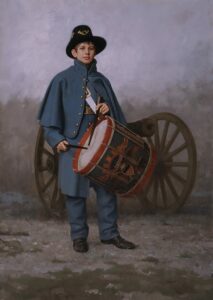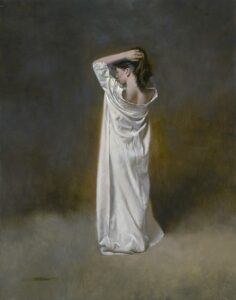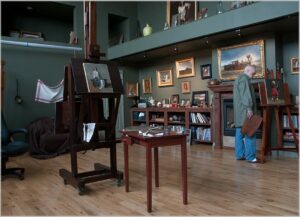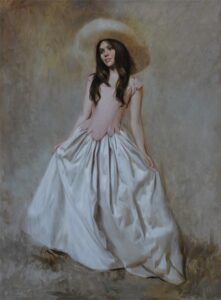From birth to his final days, William Whitaker lived and breathed art. His art and his imprint in the art world will live on for generations into the future. The OPA Master painter was born into a family of artists and musicians. His life could have gone in a very different direction because his father repeatedly told him to “get out of art,’ but thankfully it’s advice he didn’t heed. As a result, Whitaker became the modern-day master who continues to inspire multitudes of artists and collectors world-wide.
20″ x 14”,
Oil on panel.
This painting represents a drummer in the Minnesota regiment during the Sioux Uprising in 1862.
14″ x 11”
Oil on panel.
The articulate and humorous artist got his start as a child. He learned to draw from his uncle who was one of the top cartoonists at Disney. In an OPA interview with Whitaker in 2016, he said his uncle “was very talented, but he didn’t love what he was doing and eventually quit creating art.” During that interview Whitaker gave great advice that will continue his art legacy. “Follow your feelings,” he added. “You need to really like to do this. You have to have something to say.” Whitaker said we should think of ‘art talent’ as ‘art talentS’. “We all have strengths and weaknesses. Of course painting abilities are all well and good and are expected, but there are other very useful talents. Some of us are good at self-promotion. Some have writing skills. Some are good at public speaking and might have useful musical skills that can get them noticed. Some are excellent teachers with communication skills. Some can run a business and know how to get a good discount on art supplies, he chuckled. Some are organized and can make a good business plan and follow it. There is a talent for managing works of art and recording and filing. Being able to type fast and accurately is very useful. Some are good at research. Some are good at making things, including frames or shipping crates.” Whitaker graduated from the University of Utah, where he studied with portrait artist, Alvin Gittins. In the mid-60’s he lived in Los Angeles where he was art director for Capitol Records until he was recruited to create the now prestigious Illustration Department at Brigham Young University. In recent years he had retired to paint in his private studio.
16″ x 12”,
oil on panel





Tom Henshaw says
Dear Susan,
I chanced upon the paintings of William Whitaker about a couple of years ago. I can draw and paint a bit myself (but never made anything of it) and am interested in the work of the 17th century Dutch masters (major and minor). It seems to me that Mr. Whitaker shared a great deal of the aesthetic style of those painters of former ages. There aren’t many modern artists I could make that observation about, but William is certainly one of them. Beautifully loose, but neat style. gorgeous colour palette. And an authenticity of historical vision that oft-times seems affected in the work of others. I was dismayed to learn of his passing. I wish I could have contacted the man to tell him how much I enjoy his work.